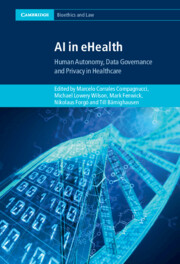Book contents
- AI in eHealth
- Cambridge Bioethics and Law
- AI in eHealth
- Copyright page
- Contents
- Contributors
- Preface
- Acronyms
- 1 Mapping the Digital Healthcare Revolution
- Part I Platforms, Apps and Digital Health
- Part II Trust and Design
- 5 Privacy Management in eHealth Using Contextual Consenting
- 6 Artificial Intelligence and Data Protection Law
- 7 AI Technologies and Accountability in Digital Health
- Part III Knowledge, Risk and Control
- Part IV Balancing Regulation, Innovation and Ethics
- Index
- Cambridge Bioethics and Law
- References
6 - Artificial Intelligence and Data Protection Law
from Part II - Trust and Design
Published online by Cambridge University Press: 08 September 2022
- AI in eHealth
- Cambridge Bioethics and Law
- AI in eHealth
- Copyright page
- Contents
- Contributors
- Preface
- Acronyms
- 1 Mapping the Digital Healthcare Revolution
- Part I Platforms, Apps and Digital Health
- Part II Trust and Design
- 5 Privacy Management in eHealth Using Contextual Consenting
- 6 Artificial Intelligence and Data Protection Law
- 7 AI Technologies and Accountability in Digital Health
- Part III Knowledge, Risk and Control
- Part IV Balancing Regulation, Innovation and Ethics
- Index
- Cambridge Bioethics and Law
- References
Summary
Artificial intelligence and automation are finding their way into the healthcare sector – some systems even claim to deliver better results than human physicians. However, the increasing automation of medical decision-making is also accompanied by problems such as the maintenance of the relationship of trust between physicians and patients or the verification of decisions. This is where the patient’s right to explanation, which is enshrined in the General Data Protection Regulation (GDPR), comes into play. This chapter explains how the right is derived from the GDPR and how it should be established.
- Type
- Chapter
- Information
- AI in eHealthHuman Autonomy, Data Governance and Privacy in Healthcare, pp. 147 - 165Publisher: Cambridge University PressPrint publication year: 2022
References
- 1
- Cited by

